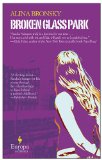Summary | Excerpt | Reading Guide | Reviews | Beyond the Book | Readalikes | Genres & Themes | Author Bio

On the first day of school my classmates stared at me as if I had just climbed out of a UFO. They asked me questions I couldn’t understand at first. Soon I could have answered them, but by then they all thought I was standoffish. It took a while for them to learn otherwise.
Considering most of them had never seen a foreigner up close before, they were all pretty nice to me. One of the first sentences I was able to understand was a compliment about my sweater. Probably out of pity. A little later, when I had learned to talk, count, and write papers and was the only one who put commas in the right places, everyone acted like they were happy for me. And maybe it was sincere.
My mother was always saying I should have friends from school over to our place. But she only said that because she was clueless. She was always inviting friends over. Twice I’d been over to the homes of girls from my class—Melanie and Carla—and I couldn’t possibly imagine having them over.
I’m not sure what threw me more: the neatness of Melanie’s room, the scent of the polished furniture—the type of furniture I thought existed only in catalogues or Anna’s fantasies— the fact that they sat around an oval dining room table for lunch instead of in the kitchen, or her horse-pattern sheets. I’d never seen such colorful sheets before. At home we had white or light-blue checked sheets, all of which were old and faded. How you could possibly fall asleep with your eyes flitting around looking at all those horses?
Melanie’s mother, by the way, was originally from Hungary. That came as a complete surprise—for one thing because Melanie had never mentioned it, and for another because she looked more stereotypically German than any other girl in our entire school. She was exactly what foreigners picture when they think of a young German girl—particularly foreigners who form that image from afar, having never been to Germany.
She had freshly cropped, always-neat, chin-length blond hair, blue eyes, rosy cheeks, and a crisply ironed jean jacket. She smelled of soap and spoke in a chirpy voice using sentences of mostly monosyllabic words, words that popped out of her mouth like peas. If I hadn’t have seen her in the flesh myself, I would never have believed someone like her actually existed.
Her mom, on the other hand, spoke with an accent— though I didn’t notice it the first time I went over there. Back then my own accent screeched as distractingly as a rusty bicycle. During lunch she stared at me with pity when she thought I wasn’t looking. She asked me questions about the town where I had grown up, the weather there, my old school, and my mother.
I told her that my mother had studied art history, that back home she had acted in a theater group that kept getting banned, that she wanted to find a little company here to join. Melanie’s mother took a sip of water and segued into a different line of questioning: wasn’t life in our housing project dangerous? I told her it was a lot cleaner and nicer than where I’d lived back there. I always referred to Russia that way—“back there.”
Melanie nibbled on her cheese-filled puff pastry and corrected her mother whenever she made a grammatical error. She also told her mother that they’d done a poll in class about what people wanted for their birthdays and seven students had said they wanted new stereos.
“So what?” said her mother, looking at Melanie through
narrowed eyes.
“Don’t you understand what that means?” said Melanie, opening her blue eyes wide. “A new stereo. Meaning they already have one. And I still don’t have one.”
“But you do have one in your room,” I said. I couldn’t talk very well, but I talked a lot.
Excerpted from Broken Glass Park by Alina Bronsky. Copyright © 2010 by Alina Bronsky. Excerpted by permission of Europa Editions. All rights reserved. No part of this excerpt may be reproduced or reprinted without permission in writing from the publisher.
A classic is a book that has never finished saying what it has to say
Click Here to find out who said this, as well as discovering other famous literary quotes!
Your guide toexceptional books
BookBrowse seeks out and recommends the best in contemporary fiction and nonfiction—books that not only engage and entertain but also deepen our understanding of ourselves and the world around us.